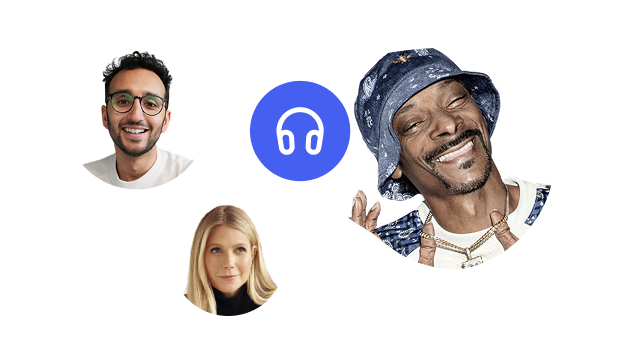As artificial intelligence advances, so does our ability to harness the power of natural language. With ChatGPT Audio, we can now interact with machines in a more efficient and natural way. So, whether you are a beginner or a pro, we cover all you need to know about the latest version of ChatGPT Audio and the overall ChatGPT API in this guide.
Understanding natural language processing (NLP)
NLP is a field of computer science that studies the interaction between computers and human language. It involves teaching machines to understand and respond to speech and writing in the same way humans do. NLP has become increasingly important in recent years as the amount of digital content has exploded. With so much information available, it's essential to have tools that can help us make sense of it all.
The evolution of NLP
The field of NLP has come a long way since its inception in the 1950s. Early attempts to understand and process language were limited by the technology of the time. However, as computers have become more powerful and data sets have grown, we have made tremendous progress. And now we have incredible open-source Python applications like ChatGPT and its advanced language models like GPT-3, GPT-3.5, and GPT-4 with incredible TTS and voice recognition capabilities. One of the biggest breakthroughs in NLP came in the 1980s when researchers developed statistical methods for language processing. These methods allowed computers to analyze large amounts of text and identify patterns in language use. This approach was a major step forward and paved the way for many of the NLP tools we use today. Another important development in NLP has been the rise of machine learning. Machine learning algorithms use statistical models to learn from data and improve their performance over time. This approach has been particularly effective in NLP, where it has been used to develop tools like sentiment analysis and speech recognition (voice assistants).
Key components of NLP
There are several key components of NLP that make it possible for machines to understand language. These include:
- Natural language generation: This involves using algorithms to generate human-like language. For example, chatbots that can carry on a conversation with a user use natural language generation.
- Natural language understanding: This involves teaching machines to understand human language. This can involve tasks like identifying the subject of a sentence or determining the sentiment of a piece of text.
- Speech recognition: This involves teaching machines to understand spoken language. Speech recognition has applications in areas like virtual assistants and automated phone systems.
Common NLP applications
NLP has a wide range of applications, including:
- Machine translation: This involves using NLP tools to translate text from one language to another. Machine translation has applications in areas like international business and diplomacy.
- Sentiment analysis: This involves using NLP tools to analyze the sentiment of a piece of text. This can be useful for businesses that want to understand how customers feel about their products or services.
- Speech recognition: This involves using NLP tools to understand spoken language. Speech recognition has applications in areas like virtual assistants and automated phone systems.
- Text classification: This involves using NLP tools to classify text into different categories. This can be useful for tasks like spam filtering and content moderation.
Overall, NLP has the potential to revolutionize the way we interact with computers and the world around us. As the field continues to evolve, we can expect to see even more exciting applications emerge.
Introducing ChatGPT audio
You may be familiar with Siri, Microsoft’s Cortana, or Amazon Alexa, but ChatGPT Audio is a revolutionary new AI tool that is set to change the way we interact with machines. With the power of natural language processing (NLP), ChatGPT Audio allows us to communicate with machines in a more human-like way than ever before. Imagine being able to have a conversation with your phone or computer, just like you would with a friend or colleague. With ChatGPT Audio, this is now possible.
What is ChatGPT audio?
ChatGPT Audio is a state-of-the-art NLP model that is designed to convert speech to text and analyze the meaning behind it. It then generates a natural language response and synthesizes it back into speech, creating a seamless and engaging conversation. The technology behind ChatGPT Audio is incredibly advanced, utilizing a large neural network to process both speech and text. The model is trained on massive data sets of human language and can recognize patterns in speech and text to generate responses that sound natural and human-like.
How ChatGPT audio works
ChatGPT Audio works by first converting speech to text using advanced speech recognition technology. The text is then analyzed using natural language processing algorithms to determine the meaning behind it. The ChatGPT Audio model then generates a response based on the analyzed text, using its vast knowledge of human language to create a response that sounds natural and engaging. The response is then synthesized back into speech and played back to the user.
Advantages of ChatGPT audio over traditional text-based GPT
ChatGPT Audio offers several advantages over traditional text-based GPT models. One of the biggest advantages is that it allows for more natural and engaging conversations. With speech, we are able to convey meaning and emotion in a way that text simply cannot match. Additionally, ChatGPT Audio offers increased accessibility for individuals who have difficulty reading or typing. By allowing users to interact with machines using speech, ChatGPT Audio opens up new possibilities for individuals with disabilities. Overall, ChatGPT Audio is an exciting new technology that has the potential to change the way we interact with machines. With its advanced NLP capabilities and seamless speech-to-text-to-speech integration, ChatGPT Audio is poised to revolutionize the way we communicate with technology.
Real-world applications of ChatGPT audio
The potential applications for ChatGPT Audio are vast and varied. Here are just a few examples of how it can be used in real-world situations:
Enhancing customer support
By employing ChatGPT Audio, companies can provide their customers with immediate and high-quality support. This can be especially helpful for individuals who are not tech-savvy or have difficulty navigating complex systems. ChatGPT Audio allows for more natural and human-like conversations that can lead to increased satisfaction and loyalty. Additionally, companies can use ChatGPT Audio to gather feedback from customers and improve their products or services based on that feedback.
Streamlining virtual assistants
Virtual assistants have become commonplace in homes and workplaces. However, they can sometimes be frustrating to use, especially when they don't understand what the user is asking. ChatGPT Audio can take these assistants to the next level, making them more intuitive and responsive to user needs. With ChatGPT Audio, virtual assistants can better understand and respond to natural language queries, making them more efficient and user-friendly.
Improving accessibility for users with disabilities
ChatGPT Audio offers a new level of accessibility for individuals who have difficulty reading or typing. It can enable these individuals to interact with machines in a more natural and engaging way. For example, individuals with visual impairments can use ChatGPT Audio to navigate websites or access information that would otherwise be inaccessible to them. Similarly, individuals with physical disabilities that prevent them from typing can use ChatGPT Audio to communicate more easily and efficiently.
Facilitating multilingual communication
ChatGPT Audio has the potential to break down language barriers by allowing individuals to communicate in their native language. This can be particularly useful in international business settings or in situations where individuals from different cultures and backgrounds need to communicate effectively. Additionally, ChatGPT Audio can aid in translation and interpretation in a variety of settings, from healthcare to legal services.
Revolutionizing education
ChatGPT Audio has the potential to revolutionize education by providing students with personalized and interactive learning experiences. With ChatGPT Audio, students can ask questions and receive immediate feedback, allowing them to learn at their own pace and in their own style. Additionally, ChatGPT Audio can be used to create virtual tutors or study partners, providing students with additional support and resources as they learn. As you can see, the potential applications for ChatGPT Audio are vast and varied. From enhancing customer support to revolutionizing education, ChatGPT Audio has the potential to transform the way we interact with machines and with each other. As the technology continues to develop and improve, we can expect to see even more exciting applications emerge in the years to come.
Challenges and limitations of ChatGPT audio
With ChatGPT Audio APIs powered by OpenAI, developers can create powerful NLP applications that provide advantages like text-independent understanding and improved accessibility for users with disabilities. However, there are several challenges and limitations to it like data security concerns, privacy issues, and technical hurdles related to audio samples.
Addressing privacy concerns
One of the biggest concerns with any technology that processes personal information is privacy. With ChatGPT Audio, subscribers may be sharing sensitive information, such as medical or financial data. It will be important for users and developers to work together to ensure that these concerns are addressed. This may include implementing strong encryption protocols, limiting access to data, and providing users with greater control over their personal information.
Ensuring data security
Another challenge with ChatGPT Audio is ensuring data security. The technology relies on massive amounts of data to function, which means that there is a lot of sensitive information being collected and stored. To prevent this data from being misused or compromised, it will be important to implement robust security measures. This may include using secure servers, implementing multi-factor authentication, and regularly monitoring for potential security breaches.
Overcoming ChatGPT’s audio technical hurdles with Speechify’s easy-to-use speech synthesis tool
When it comes to online communication, audio problems can be a major headache, especially if you don’t have tutorials to help you out. But what if there was an easy way to overcome those technical hurdles and ensure smooth, seamless conversations every time? Enter Speechify, an innovative speech synthesis tool that makes it easy to convert text to speech in the language of your choice. Whether you need to communicate with colleagues, customers, or friends from around the world, Speechify has got you covered. Despite these obstacles, various use cases like customer support, virtual assistants, multilingual communication, and education have been enabled due to the potential of GPT audio technology. And with its easy-to-use interface and customizable settings, you can quickly and easily generate high-quality AI voices in the language of your choice. You can use Speechify TTS for a variety of purposes, such as your Linkedin projects, YouTube videos, or creating voiceovers in real-time. It’s also available on Android, IOS (Apple), and as a Chrome add-on with ready templates. So why wait? Give Speechify a try today and experience the power of seamless online communication firsthand.





